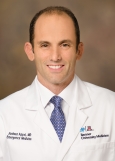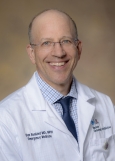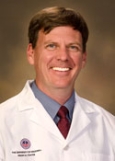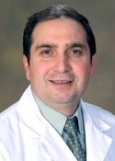Knowledge Transfer
The University of Arizona Department of Emergency Medicine (UA DEM) offers the Knowledge Transfer Collaborative, whose mission is to provide engaging, innovative, continuing education in the field of emergency medicine to interdisciplinary, health care professionals, worldwide.
Evidence-Based Decision Making & Clinical Effectiveness Research
Part of the Knowledge Transfer Collaborative includes work to advance evidence-based medical (EBM) skills through the access to electronic medical information resources. The Department of Emergency Medicine is conducting research to integrate customized, evidence-based search strategies for a variety of health care providers, through the work of Dr. Samuel M. Keim.
Dr. Keim is leading a team of informaticians and programmers in the development of EBM Search, a meta-search interface, that allows simultaneous searching of hundreds of electronic medical information resources. He believes that EBM can only occur if clinicians have basic competencies in 1) identifying knowledge gaps; 2) asking questions; 3) acquiring evidence; 4) appraising evidence; 5) applying evidence; and 6) assessing the impact of new knowledge gained. His research looks at the medical information search behavior of medical students, resident physicians and post-graduate clinicians. His team is working on the next generation of electronic meta-evidence search and delivery tools.
We also offer the following trainings:
For more than 20 years, UA Emergency Medicine and the Arizona Emergency Medicine Research Center have been worldwide leaders in HAZMAT and disaster preparedness education. Through the leadership of Frank G. Walter, MD and Harvey Meislin, MD, we offer multiple comprehensive courses designed to provide health care providers from a wide variety of backgrounds with the training necessary to care for patients injured in a disaster or involved in a HAZMAT incident.
Advanced Disaster Preparedness & Response (ADPR)
Disasters are spiking worldwide requiring augmented awareness and proficiency in interdisciplinary, clinical response to improve medical care for disaster victims. ADPR™ trains personnel to recognize and use current triage systems, learn typical hazards in various scenarios (tornado, flood, earthquake) and the ABCDE paradigm of ADPR™.
Upon completion, the participant will be able to:
- Apply the ABCDEs paradigm of ADPR™ to your practice.
- Define the meaning of each letter in the ABCDE paradigm of ADPR™
- Refine your situational awareness.
- Use current triage systems (MASS, SALT, START with RPM).
- Describe decontamination for each of the three general types of hazards.
Advanced Hazmat Life Support (AHLS)
Advanced HAZMAT Life Support (AHLS) is the world’s most comprehensive training program providing the critical skills needed to treat victims exposed to toxic substances.
AHLS is for interdisciplinary healthcare professionals, including paramedics, physicians, nurses, nurse practitioners, physician assistants, pharmacists, respiratory therapists, toxicologists and military personnel.
The AHLS Provider Course is the primary course offered worldwide. The Provider Course is the premier, international course that teaches a systematic, effective response for the medical management of patients exposed to hazardous materials, including chemical, biological, radiological and nuclear agents.
The 16-hour, two-day AHLS Provider Course is the most comprehensive training program providing the critical skills needed to evaluate and treat victims exposed to toxic substances in incidents such as chemical spills or toxic terrorism.
Join the more than 14,000 physicians, nurses, paramedics, pharmacists and other healthcare professionals from 64 countries, and become an AHLS verified Provider to be ready to face the medical challenges of hazmat incidents, such as chemical spills or toxic terrorism. Continuing Education credits are available to AHLS participants through AMA, ACPE, ACEP and CECBEMS.
AHLS offers several courses including the following half-day courses:
- AHLS for Chemical Burns
- AHLS for Radiological Incidents and Terrorism
- AHLS for Toxic Terrorism
Faculty and Staff:
Frank G. Walter, MD, FACEP, FACMT, FAACT, professor, is a clinical toxicologist who serves as the medical director for the Arizona Department of Health Services’ Bureau of Public Health Emergency Preparedness and the chair of the Scientific Advisory Committee and editor for the Advanced Hazmat Life Support courses and co-developer of the Advanced Disaster Preparedness & Response Course.
Joshua E. Appel, MD, assistant professor, is the medical director of adult and trauma services at UAMC-University Campus.
Dan Beskind, MD, MPH, FACEP, is an assistant professor and the EMS director of the Base Hospital at UAMC-South Campus. Dr. Beskind is a co-developer of the educational series Advanced Disaster Preparedness & Response.
Robert French, MD, is an assistant professor and clinical toxicologist with fellowship training in prehospital and disaster medicine.
Joshua Gaither, MD, assistant professor, is a co-developer of the educational series Advanced Preparedness & Response with fellowship training in prehospital and disaster medicine.
Samuel M. Keim, MD, MS, professor, is the department head and director of the Arizona Emergency Medicine Research Center.
F. Mazda Shirazi, MD, PhD, associate professor, is a clinical toxicologist and serves as the medical director of the University of Arizona Poison and Drug Information Center and director of the Medical Toxicology Fellowship.
Knowledge Transfer Research Faculty
 |
 EMS Director, Banner-UMC South Base Hospital, Medical Director, Arizona Ambulance
|
 Asst. Medical Director, Prehospital HAZMAT Operations, Medical Toxicology Faculty
|
 Med. Director, Arizona Poison & Drug Information Center, Program Director, Medical Toxicology Fellowship
|

